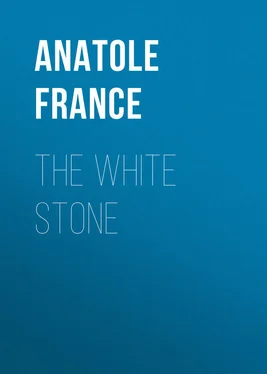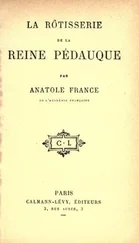Anatole France - The White Stone
Здесь есть возможность читать онлайн «Anatole France - The White Stone» — ознакомительный отрывок электронной книги совершенно бесплатно, а после прочтения отрывка купить полную версию. В некоторых случаях можно слушать аудио, скачать через торрент в формате fb2 и присутствует краткое содержание. Жанр: foreign_antique, foreign_prose, на английском языке. Описание произведения, (предисловие) а так же отзывы посетителей доступны на портале библиотеки ЛибКат.
- Название:The White Stone
- Автор:
- Жанр:
- Год:неизвестен
- ISBN:нет данных
- Рейтинг книги:4 / 5. Голосов: 1
-
Избранное:Добавить в избранное
- Отзывы:
-
Ваша оценка:
- 80
- 1
- 2
- 3
- 4
- 5
The White Stone: краткое содержание, описание и аннотация
Предлагаем к чтению аннотацию, описание, краткое содержание или предисловие (зависит от того, что написал сам автор книги «The White Stone»). Если вы не нашли необходимую информацию о книге — напишите в комментариях, мы постараемся отыскать её.
The White Stone — читать онлайн ознакомительный отрывок
Ниже представлен текст книги, разбитый по страницам. Система сохранения места последней прочитанной страницы, позволяет с удобством читать онлайн бесплатно книгу «The White Stone», без необходимости каждый раз заново искать на чём Вы остановились. Поставьте закладку, и сможете в любой момент перейти на страницу, на которой закончили чтение.
Интервал:
Закладка:
“ E proprio vero ,” said Boni in a low tone, as he replaced the oaken lid on the coffin of the Romulean child.
Then, begging his guests to be seated, he said to Nicole Langelier:
“I shall now hold you to your promise, and beg you to read to us that story of Gallio, at which I have seen you at work in your little room in the Foro Traiano . You make Romans speak in your script. This is the spot to hear your narrative, here in a corner of the Forum, close by the Via Sacra, between the Capitol and the Palatine. Tarry not with your reading, so as not to be overtaken by the twilight, and lest your voice be quickly drowned by the cries of the birds warning one another of approaching night.”
The guests of Giacomo Boni welcomed the foregoing utterance with a murmur of approval, and Nicole Langelier, without waiting for more pressing entreaties, unrolled a manuscript and read aloud the following narrative.
II
GALLIO
In the 804th year of the foundation of Rome, and the 13th of the principality of Claudius Cæsar, Junius Annæus Novatus was proconsul of Achaia. Born of a knightly family of Spanish origin, a son of Seneca the Rhetor and of the chaste Helvia, a brother of Annæus Mela, and of the famed Lucius Annæus, he bore the name of his adoptive father, the Rhetor Gallio, exiled by Tiberius. In his mother’s veins flowed the same blood as that of Cicero, and he had inherited from his father, together with immense wealth, a love of letters and of philosophy. He studied the works of the Greeks even more assiduously than those of the Latins. His mind was a prey to noble aspiration. He was an interested student of nature and of what appertains to her. The activity of his intelligence was so keen that he enjoyed being read to while in his bath, and that, even when joining in the chase, he was wont to carry with him his tablets of wax and his stylus. During the leisure moments which he managed to secure in the intervals of most serious duties and most important works, he wrote books on subjects relating to nature, and composed tragedies.
His clients and his freedmen loudly proclaimed his gentleness. His was indeed a genial character. He had never been known to give way to a fit of anger. He looked upon violence as the worst and most unpardonable of weaknesses.
All deeds of cruelty were held in execration by him, save when their true character escaped him owing to the consecration of custom and of public opinion. He frequently discovered, amid the severities rendered sacred by ancestral usage and sanctified by the laws, revolting excesses against which he raised his voice in protest, and which he would have attempted to sweep away, had not the interests of the State and the common welfare been objected from all quarters. In those days, conscientious magistrates and honest functionaries were not few and far between throughout the Empire. There were indeed a number as honest and as impartial as Gallio himself, but it is to be doubted whether another could be found so humane.
Entrusted with the administration of that Greece despoiled of her riches, her pristine glory departed, and fallen from her freedom so full of life into an idle tranquillity, he remembered that she had formerly taught the world wisdom and the fine arts, and his treatment of her combined the vigilance of a guardian with the reverence of a son. He respected the liberties of the cities and the rights of individuals. He showed honour to those who were truly Greeks by birth and education, regretting that their numbers were sorely restricted, and that his authority extended for the greater part over an infamous rabble of Jews and Syrians; yet he remained equitable in dealing with these Asiatics, laying unction to his soul for what he considered a meritorious endeavour.
He dwelt in Corinth, the richest and most densely populated city of Roman Greece. His villa, built in the time of Augustus, enlarged and embellished since then by the pro-consuls who had governed the province in succession, stood on the furthermost western slopes of the Acrocorinthus, whose foliaged summit was crowned by the Temple of Venus and the groves where dwelt her priests. It was a somewhat spacious mansion surrounded by gardens studded with bushy trees, watered by springs, ornamented with statues, alcoves, gymnasia, baths, libraries, and altars consecrated to the gods.
He was strolling in it on a certain morn, according to his wont, with his brother Annæus Mela, discoursing on the order of nature and the vicissitudes of fortune. The sun was rising, hazy in its white splendour in the roseate heavens. The gentle undulations of the hills of the Isthmus concealed the Saronic shore, the Stadium, the sanctuary of the sports, and the eastern harbour of Cenchreæ. Between the fallow slopes of the Geranean range and the crimson twin-peaked Helicon, one could, however, obtain a glimpse of the quiescent blue waters of the Alcyonium Mare. In the distance, and to the north, glistened the three snow-capped summits of Parnassus. Gallio and Mela proceeded together as far as the edge of the elevated foreground. At their feet spread Corinth standing on an extensive plateau of pale yellow sand, and sloping gently towards the spumous fringe of the Gulf. The pavements of the forum, the columns of the basilica, the tiers of the hippodrome, the white steps of the porches sparkled, while the gilded roofs of the temples flashed dazzling rays. Vast and new, the town was intersected with straight-running streets. A wide road descended to the harbour of Lechæum, whose shore was fringed with warehouses and whose waters were covered with ships. To the west, the atmosphere reeked with the smoke of the iron-foundries, while the streams ran black from the pollution of the dye-houses, and on that side, forests of pine extending to the edge of the horizon, were lost to sight in the skies.
Gradually, the town awoke from its slumbers. The strident neighing of a horse rent the morning calm, and soon were heard the muffled rumblings of wheels, shouting of waggoners, and the chanting voices of women selling herbs. Emerging from their hovels amid the ruins of the Palace of Sisyphus, aged and blind hags bearing copper vessels on their heads, and led by children, wended their way to draw water from the Pirene fountain. On the flat roofs of the houses abutting the grounds of the proconsul, Corinthian women were spreading linen to dry, and one of them was castigating her child with leek-stalks. In the hollow road leading to the Acropolis, a semi-nude old bronze-coloured man, prodded the rump of an ass laden with salad herbs and chanted between the stumps of his teeth and in his unkempt beard, a slave-song:
“Toil, little ass,
As I have toiled.
Much good will it do you:
You may be sure of it.”
Meanwhile, at the sight of the town resuming its daily labour, Gallio fell a-musing over the earlier Corinth, the lovely Ionian city, opulent and joyous until the day when she witnessed the massacre of her citizens by the soldiery of Mummius, her women, the noble daughters of Sisyphus, sold at auction, her palaces and temples the prey of flames, her walls razed to the ground, and her riches piled away into the Liburnian ships of the Consul.
“Hardly a century ago,” he remarked, “the work wrought by Mummius still stood revealed in all its horror. The shore which you see, brother mine, was more of a desert than the Libyan sands. The divine Julius rebuilt the town wrecked by our arms, and peopled it with freedmen. On this very strand, where the illustrious Bacchiadæ formerly revelled in their haughty indolence, poor and rude Latins settled, and Corinth entered upon a new lease of life. She grew rapidly, and realised how to take advantage of her position. She levies tribute on all ships which, whether from the East or from the West, cast anchor in her two harbours of Lechæum and Cenchreæ. Her population and wealth increase apace under the ægis of the Roman peace.
Читать дальшеИнтервал:
Закладка:
Похожие книги на «The White Stone»
Представляем Вашему вниманию похожие книги на «The White Stone» списком для выбора. Мы отобрали схожую по названию и смыслу литературу в надежде предоставить читателям больше вариантов отыскать новые, интересные, ещё непрочитанные произведения.
Обсуждение, отзывы о книге «The White Stone» и просто собственные мнения читателей. Оставьте ваши комментарии, напишите, что Вы думаете о произведении, его смысле или главных героях. Укажите что конкретно понравилось, а что нет, и почему Вы так считаете.










